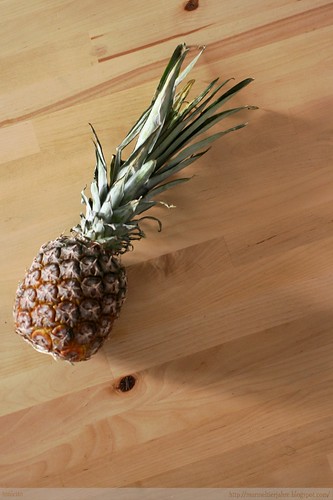There's something interesting about fruit and vegetables and especially about the words we use for them. If you are asked to name a fruit really quickly, it would be not at all surprising if you think of an apple. Apples are like the quintessential fruits. Not only because they possess most of the features that we associate with fruit (round, coloured, it has a stem, ...), there is something about the word itself as well.
Many other fruits are named after apples, in many (European) languages. We've got the pineapple, the pomegranate (pomme being French for apple) or Granatapfel in German, there is Apfelsine in German for orange (probably because oranges come from China), we've got the Italian pomodoro (for tomato), which I would say means "golden apple". And do not forget one of my favourites: the French pomme de terre (potato), which means literally "ground apple" and has a nice direct translation in the Austrian local word Erdapfel. How did all these very different fruits and vegetables end up having such close words? 
My theory is as follows. Centuries ago, as traders and explorers wandered around the world, they tried to bring something that would impress people back in Europe. Precious silk, unknown animals, rare spices and, of course, exotic fruit and vegetables. Now the problem with unknown stuff is that you have to come up with a name for it. What are your references when you have to name a new thing? Those things that you know and are familiar with. What is most familiar when you have find a name for a new fruit? Of course, the quintessential fruit: apples.
I would even say, people would use the word apple as a generic word for fruit, because at the very beginning, before traders and explorers started bringing strange stuff, there were mostly only apples. There might have been no actual distinction between fruit and apple, and the fact that we still use apples today to name that many other fruit and vegetables can be proof of that.
Can you think of other fruit whose name comes from apple?
Saturday, 11 April 2009
Apples
Labels:
favourite words,
I've got a theory
Subscribe to:
Post Comments (Atom)

 versión en español
versión en español







2 comments:
Erdaepfel,Kornaepfel,(hellhaeutige Fruehaepfel),Holzaepfel,Aus Holz meist rot gestrichen zur Weihnachtdekoration,aber auch der Apfel der Aepfel.Der sogenannte Urapfel.Ein wilder Apfel frueher in Bauernobstwiesen gezogen aus wild aufgegangenen Apfelkernen,frueher fuer die Schnapsbrennerei verwendet.Zum essen ist er zu hart und zu klein.Nicht zu verwechseln mit der Quitte.
Ich glaube der Apfel an sich ist die Frucht der Fruechte.Es genuegt ein Apfel am Tag um den Vitamin und Mineralienbedarf eines Menschen an einem Tag zu decken,um nicht an Mangel- erscheinungen zu leiden.
Ausserdem dient er als Gesundheitspolizei in gekochtem wie rohem Zustand.Roh geschabt eingenommen gegen Diarroea,gekocht mit viel Fluessigkeit bei Obstibation.Ein Apfel normal gegessen mit Schale dient als Gesundheitspolizei des Koerpers.
Mir ist kein Obst bekannt,das die gleichen Eigenschaften hat wie der Apfel,der sogar in Kleinstmengen versteht sich, bereits an Fruehgeborene verabreicht werden kann.
Deshalb denke ich ,dass der Apfel die "Urfrucht" als solche ist.
Bei Gemuese ist es die Karotte (Mohrruebe,gelbe Ruebe,)waere interesannt zu wissen ob die verwandt sind in ihrer DNA.Hm, haben Fuechte und Gemuese so eine?
Wie ists mein Forscher kannst du das rausfinden?Waer doch interesannt herauszufinden wer mit wem verwandt ist!?LG.G
Gitta said...Erdäpfel (potato), Kornäpfel (http://de.wikipedia.org/wiki/Kornapfel), Holzäpfel (red wooden apples used as Christmas decoration), and especially the mother of all apples: the so-called Urapfel (urapple), a wild apple cultivated in fruit orchards from fruit-bearing apple seeds, that was used for distillery. It is too small and too hard to be eaten. It should not be confused with Quitte (quince).
I think apples are the mother of all fruits. A single apple a day covers daily vitamin and mineral needs in order to properly fight deficiency symptoms.
Furthermore apples act as health police both cooked and raw. t helps trimmed in raw against diarrhoea, cooked with fluid against constipation. An apple eaten with peel acts as health policeman for the body.
I do not know any fruit having so many properties as apples, which you can even feed it (in very small quantities) to premature babies.
That's why I think that apples are the "urfruits". On the vegetable side carrots play this role. It would be interesting to know if apples and carrots are related to each other in their DNA. Hm, do fruits and vegetables have DNA?
How would it be, my researcher, can you find it out? It would be interesting to know who is related to whom!?
LG. G
Gitta, wow, once more you astonished me with your encyclopaedic knowledge of fruits and vegetables! I did not know that much about apples (just the saying "an apple a day keeps the doctor away"!), but now that you say it, it may well be that the apple, being so important and rich and good, was taken as name basis for many other fruits.
To your question about DNA: Definitely yes, fruits and vegetables have DNA, too. In fact, every single living thing on Earth (bacteria, archaea, mushrooms, plants, animals) has its "blueprints" (Baupläne) stored in each one of its cells. And the language used for this blueprints is DNA. Incidentally, viruses do have a DNA (or a similar version of it, called RNA), but they can not be considered alive, although they are sadly quite able to reproduce! :(
I don't know if apples and carrots are related in their genomes, in their DNA. But I'll really try to find out. In fact, evolution theory tells us that all living things are related to each other, you, me, a horse, an apple and a carrot do descend from a (very very very) distant common ancestor!
Thanks for your comment!
LG T.
Post a Comment